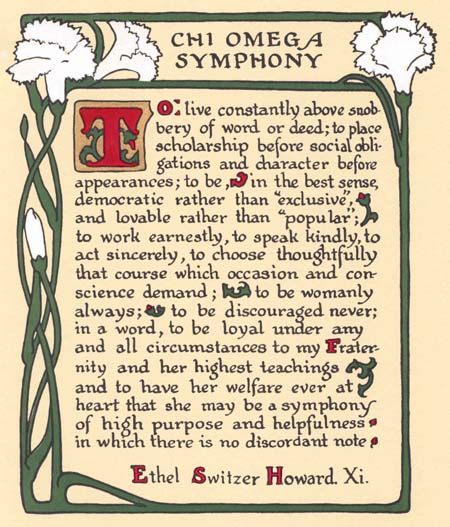By Laura Shrode Miller, National Vice President of Chi Omega Fraternity

For most Chi Omegas, there is nothing more inspirational than our Symphony. The words are inspirational, and also aspirational; they provide a powerful, yet simple, score for living a purposeful life.
“To have her welfare ever at heart” is part of the well-known ending of The Symphony. This phrase rarely makes the list of favorite lines, which seems odd upon reflection. After all, isn’t this at the heart of being a Chi Omega Sister? Isn’t this what should distinguish Chi Omega friendships from other relationships that may be more situational or temporal?

And about that word “her”…such a simple possessive pronoun. In context, it simply refers to the Fraternity and our individual responsibility to contribute to a harmonious whole – a lofty and worthy goal. But what if this “her” were re-imagined as a real person? “Her” takes on an entirely different connotation.
“Her” becomes a “she.”
A somebody. A roommate. A pledge Sister. A person with a name and a face. A friend.
In this re-imagined context, “her” is anything but simple.
In similar fashion, this well-worn phrase from our Symphony then changes from a lofty ideal to a call to action. After all, “to have her welfare ever at heart” speaks to the essence of a Chi Omega Sisterhood that is a tapestry of authentic and deeply connected friendships. It reminds us that our Chi Omega relationships are uniquely rooted in a ritual that celebrates selflessness, truth, and the potential of women.
Are we meeting this mandate? How well are we answering this call to action?
The Erosion of the Fraternal Experience
Unfortunately, there is little need to poll the majority of University leaders regarding the answers to these questions. In many Greek communities, the actions (and, sadly, inactions) of some have been well-documented and offer a view of fraternal life that is the antithesis of authentic friendship and respect. The litany of offenses is all too familiar – hazing, forced drinking, sexual assault, and careless disregard for others to name just a few – and has resulted in the deaths of young people and inflicted physical and emotional wounds upon others for a lifetime.
While most of this activity is attributable to men’s groups, there is little doubt that women have likely been complicit, at a minimum, by inaction. By tolerance. By indifference.
With this narrative as a backdrop, it is easy to see why there has been a widespread devaluing of the Greek experience, at best, and a movement to eliminate fraternity and sorority life on the most extreme end.
Benefits When the Fraternal Experience is Done Correctly
This current narrative does not have to be Chi Omega’s story – nor should it be. Fortunately, Chi Omega is well-positioned on 181 campuses to answer the call to action and demonstrate the importance of a Greek experience done well by making meaningful contributions to campus life and the community, as a whole. Rarely has there been a time that an exemplary fraternal experience has been more needed.
Our chapters can, and should, be a laboratory for personal growth within the safe confines of friendship and Sisterhood without sacrificing the fun. This is both a realistic and attainable goal. In fact, it should be a minimum standard.
We know how to do this. In addition to our ritual, Symphony author Ethel Switzer Howard laid it out for us in 1904. Chart “that course which occasion and conscience demand.” Be responsible both to and for each other by shedding the trends of indifference and inaction.
After all, the whole of Chi Omega is literally the sum total of the choices made by individual Sisters. And when those choices are incongruent with living a purposeful life, let’s take action “to have her welfare ever at heart,” no matter how uncomfortable. Our goal remains unchanged – “that she may be a Symphony of high purpose and helpfulness in which there is no discordant note.”
Laura Shrode Miller, Rho Epsilon Chapter/TCU, has had a longstanding interest in and commitment to the fraternal experience and higher education. She currently serves as National Vice President for Chi Omega Fraternity. In addition to nine years of service on the Governing Council, Laura has also been a Chi Omega National Volunteer for over 30 years and a chapter advisor since 1980.
Laura has been very involved with TCU having served on the Board of Trustees and as a member of the Executive Committee. She has also served as President of the National Alumni Association, has received the Alumni Service Award, the President’s Service Award, and the Outstanding Sorority Advisor Award.
In Fort Worth, Laura has served on numerous boards including the Junior League, Trustee and Executive committee member of Trinity Valley School, and is an Elder at her church. Professionally, Laura is The Fort Worth Community Bank President for Veritex Bank.
